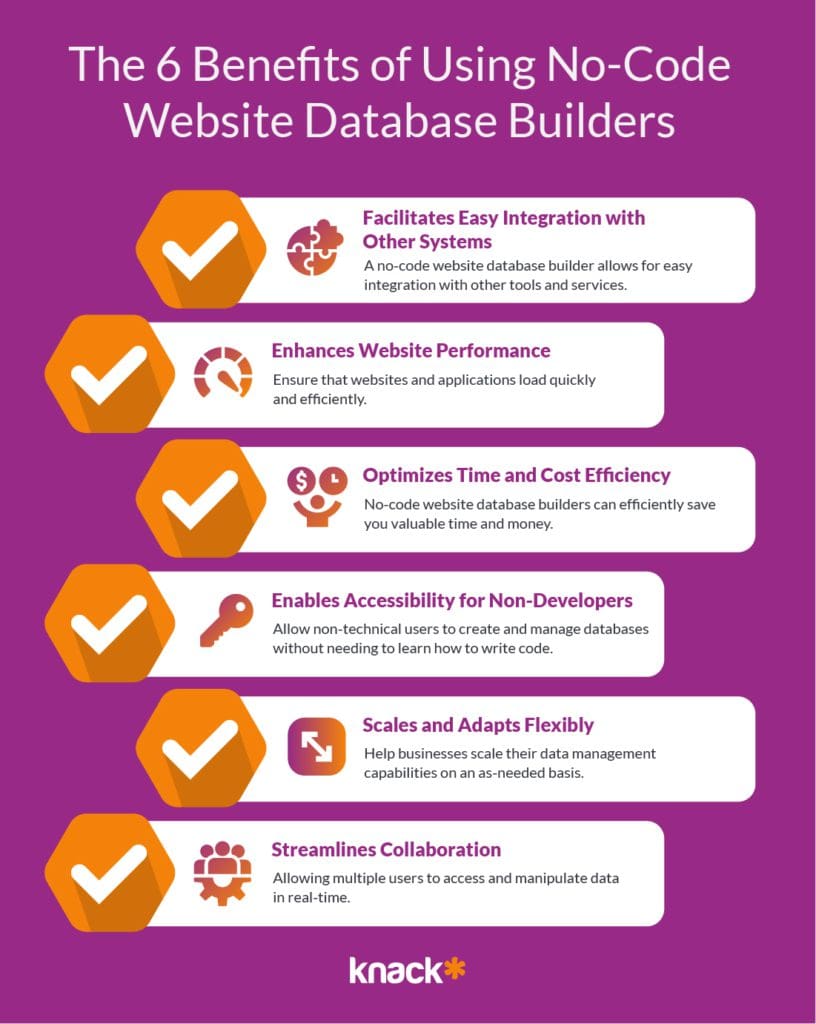No-Code Platforms for Open System Database Development: Conserve Time and Resources
No-Code Platforms for Open System Database Development: Conserve Time and Resources
Blog Article
Checking Out the Benefits of Scalable Databases That Call For No Coding Abilities for Effective Information Management Solutions
The appearance of scalable databases that remove the requirement for coding skills offers a transformative possibility for companies seeking reliable data management remedies. By enabling non-technical users to harness the power of data with user-friendly user interfaces, these systems improve availability and foster partnership throughout diverse teams. Their cost-effectiveness and versatility to evolving organization demands can significantly simplify functional processes. As we consider the implications of such developments, it ends up being crucial to analyze how they can reshape the landscape of data administration and drive sustainable growth in a competitive environment.
Boosted Accessibility for Customers
Boosted availability for customers is an important aspect of scalable data sources, guaranteeing that data administration systems are intuitive and user-friendly. In a period where data-driven decisions are extremely important, ease of access enables a bigger range of individuals, consisting of those without comprehensive technological knowledge, to engage with data source systems properly. This democratization of data accessibility helps with boosted cooperation across divisions, encouraging staff members to make and draw out understandings educated decisions.
Easy to use interfaces, such as drag-and-drop attributes and visual information depiction, streamline complicated data interactions. These improvements decrease the learning curve related to typical data source management, enabling users to focus on leveraging data as opposed to coming to grips with technical intricacies. Moreover, scalable databases commonly incorporate real-time analytics and customizable control panels, providing users with instant understandings tailored to their particular demands.

Cost-Effectiveness and Source Financial Savings
Effective information management not just depends upon ease of access yet likewise on cost-effectiveness and resource financial savings. Scalable databases designed for customers with no coding skills substantially decrease economic concerns usually linked with traditional database monitoring systems. By getting rid of the need for specialized shows knowledge, organizations can allot their resources much more efficiently, concentrating funds on core service tasks instead of comprehensive training or working with experienced workers.
In addition, these databases frequently use cloud-based remedies, which even more minimize expenses associated with equipment and maintenance. Organizations can scale their data source solutions according to their demands, staying clear of the expenses incurred from over-provisioning resources. This versatility implies companies can adjust to changing needs without incurring unnecessary prices, causing substantial long-lasting cost savings.
In addition, easy to use interfaces improve data entry and monitoring procedures, minimizing the time spent on management jobs. This efficiency translates right into labor price financial savings, allowing groups to concentrate on tactical campaigns instead of routine maintenance. In general, adopting scalable databases that need no coding abilities promotes an extra economical technique to information monitoring, making it possible for companies to maximize their sources while maintaining high degrees of functional effectiveness.
Improved Cooperation Across Teams

Additionally, scalable databases assist in seamless communication amongst group participants. With Continue easy to use user interfaces that call for no coding abilities, staff members can easily create, change, and share records or dashboards customized to their details needs. This democratization of data empowers non-technical individuals to add understandings, improving the collaborative environment.
Furthermore, these data sources sustain concurrent access, enabling several individuals to work with the exact same dataset at the same time. This feature enhances efficiency, as groups can engage in joint data analysis without the danger of version control problems. The capability to leave notes or remarks directly within the database further promotes discussion and clarifies information analyses.
Streamlined Information Management Processes
In today's data-driven setting, organizations recognize the need of streamlined information management processes to make best use of effectiveness and precision. By leveraging scalable data sources that call for no coding abilities, businesses can streamline their data handling and lower the complexities normally related to conventional data source systems. This availability encourages non-technical users to involve directly with information, assisting in quicker decision-making and decreasing reliance on specialized IT employees.
Streamlined information management processes improve process by automating routine tasks such as information entrance, recognition, and coverage. Automated data integration makes sure that details from numerous resources is aggregated flawlessly, getting rid of silos and cultivating a combined view of crucial organization metrics (no-code). In addition, straightforward interfaces enable personnel to adjust information easily, allowing them to produce understandings that drive calculated initiatives without the requirement for comprehensive training.
This effectiveness not just increases operational procedures but likewise minimizes the capacity for human mistake, making sure that information remains exact and trusted. Inevitably, streamlined data administration processes through scalable data sources bring about boosted efficiency, permitting organizations to concentrate on core activities while guaranteeing that their information administration practices are efficient and effective.
Scalability for Growing Services

For broadening enterprises, the capacity to scale up or down is important. A scalable database can take care of an increase of information generated from brand-new customers, products, or solutions, guaranteeing that service procedures remain continuous. These databases provide the capacity to manage peak loads effectively, which is crucial throughout durations of fast development or seasonal spikes.
Furthermore, several scalable database services are designed with user-friendly user interfaces that need no coding skills, encouraging non-technical personnel to manage information successfully (no-code). This democratization of data administration allows organizations to assign sources purposefully and lower dependence on specialized IT workers
Ultimately, taking on a scalable database not only enhances functional effectiveness however likewise cultivates a setting where companies can innovate and progress without the restrictions of standard data source systems. This flexibility settings organizations for long-lasting success in today's affordable landscape.
Conclusion
In verdict, scalable databases that call for no coding skills give considerable advantages for reliable information management. By streamlining information monitoring processes and using scalability for expanding organizations, such services make it possible for companies to adjust to changing demands successfully.
Boosted access for users is a crucial element of scalable data sources, guaranteeing that data management systems are user-friendly and user-friendly.User-friendly user interfaces, such as visual data and drag-and-drop attributes representation, simplify complex information interactions. Generally, taking on scalable databases that need no coding abilities promotes an extra economical approach to data management, allowing organizations to optimize their resources while maintaining high degrees of operational effectiveness.
By leveraging scalable data sources that require no coding skills, services can streamline their data handling and decrease the complexities commonly associated with conventional data source systems - no-code.Streamlined data monitoring processes boost workflow by automating regular tasks such as data entrance, recognition, and reporting
Report this page